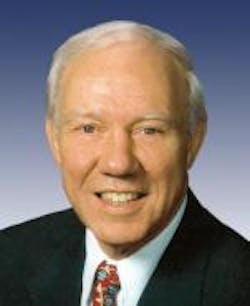“It’s interesting coming back to a third world country.” –Congressman James Oberstar, outgoing chairman of the House of Representatives’ Committee on Transportation and Infrastructure, commenting on the U.S. approach to transportation compared to France
Didn’t know you lived in a “third world” country, did you? I didn’t either and was most surprised to find the U.S. characterized as such by outgoing Congressman James L. Oberstar (D-MN), who narrowly lost a re-election battle this month and so now is wrapping up a nearly 36-year legislative career.
Oberstar uttered the quote above in referencing his return to the U.S. after a recent vacation in France, where he travelled on high-speed trains (known as ‘Trains à Grande Vitesse’ or TGV for short).
The soon-to-be-former congressman lavished praise on these billion-dollar technological wonders: trains capable of going over 170 mph with nary a “quiver” to be detected in the delectable red wine the good legislator from Minnesota sipped. “And they carried over 700 passengers, too; you can’t stuff that many people on an airplane,” he noted.
Oberstar went on to point out that the heavy use of high-speed rail by France – as well as across Europe – represents a far more “enlightened” approach to thorny transportation issues. Another such “enlightened” tactic is how French car and truck drivers get taxed heavily not once but TWICE for their decision to choose vehicles over trains, and how the government gets to put that money straight into its “general revenue fund.”
“Fuel prices in France we saw ranged from $1.34 to $1.42 per liter – and, as there are five liters in a gallon, that’s equivalent to $7.50 per gallon of gasoline,” he said. “The tax money then goes into the general revenue fund and is redistributed to many projects besides transportation.”
[Here are some other transportation thoughts from Oberstar he made last year.]
There are also a large number of highway tolls throughout Europe, meaning vehicle operators “pay twice” to drive on the roads, in terms of tolls and fuel taxes – an economic burden that helps “drive more people to use passenger rail,” Oberstar said.
And Europeans think big in terms of transportation, too (and why not? They sure are raking it in, especially in terms of highway tolls and taxes apparently). Oberstar pointed to a plan to build a $1.3 trillion canal through the heart of Europe linking the North Sea (separating Sweden and Germany) to the Black Sea (which borders Russia, Turkey, and Greece).
“And here we sit on the sidelines [in terms of transportation] while the Europeans eat our lunch,” he said.
All I can say is: Wow. Oberstar might have “an encyclopedic knowledge” of the transportation industry, as many industry experts note, and speaks French well (as he demonstrated during the press conference) but did he really mean to give such a harsh backhand slap to his home country in this fashion?
I mean, come on: transportation networks in Europe and the U.S. are as similar as apples and oranges. Texas alone is almost the size of France. Passenger trains similar to what Oberstar experienced in France work great in a country of limited geography, cluttered with urban cities. Try taking a train from Minnesota to Washington D.C., or from the high plains where towns are few and far between. High speed or not, it’ll take you days versus HOURS by plane to cross such distances.
Then there’s train service to more remote locations. I can drive to Williamsburg Va. From Washington D.C. in good traffic conditions in about 2 hours and 30 minutes; by train it’s nearly 5 hours. I can also take my whole family in one vehicle; a train trip would require five costly tickets.
Then there’s the issue of tolls. Have you ever driven on a highway cluttered by toll booths? As any trucker will tell you, they reduce travel to a snail’s pace, leading to the very kinds of traffic congestion, exhaust pollution, and vehicle fuel consumption issues the soon-to-be-former transportation chairman wants to avoid.
Of course, we forget other more central problems to such a grand “rail vision” for this “third world” country of ours.
First, the tracks are owned (and thus controlled) by freight railroads and I know from first-hand experience what a problem this is, for when I used to work in downtown Washington D.C. I sat many a time on the Virginia Railway Express commuter train for long stretches going nowhere because Norfolk Southern had coal trains to move. That can make train travel a less attractive option for many folks no matter what your political stripes may be.
Then there’s this other small issue: we, as a nation, are broke. We’ve got over $15 trillion in red ink accumulated on our books, so that would seem to me to preclude any grand notions of building an entirely separate track system for high-speed trains.
Oh, yes, don’t forget that part – you need to build a separate network for them. You see, the turbulence created by such 170 mile-an-hour wonder machines destabilizes freight trains. Our existing rail network isn’t built to handle such velocities, either, so current track – even if we could use it for passenger rail purposes – would have to be retrofitted.
Finally, a lot of smart folks are coming up with new transportation solutions, too. Freight haulers and everyday motorists alike are starting to use more hybrid and fully electric vehicles now. More intermodal connections – between trucks, railroads, ships, etc. – are being used. Even the cars and trucks we drive today are safer and cleaner than models built even five years ago.
Not too shabby for a “third world” country I’d say.
